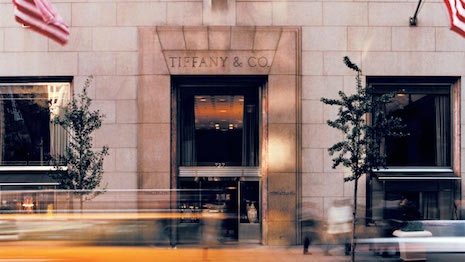By Daniel Hodges
What are the winning factors in luxury retail today?
First and foremost is the ability of the brand and the people representing the brand to tell a unique brand story. Below, in some detail, are nine factors:
Brand story: All winning retail stores have a unique brand DNA story that was born out of a market need or a visionary founder.
Tiffany is an example of such a brand. Founded in 1837 by Charles Lewis Tiffany and John B. Young in Brooklyn, CT, as a "stationery and fancy goods emporium," the store initially sold a wide variety of stationery items, and operated as "Tiffany, Young and Ellis" in Lower Manhattan.
Fast forward many years, the iconic Fifth Avenue store featured in the classic “Breakfast at Tiffany’s” is a store with a tradition of unmatched elegance and quality.
Human touch: Apple Stores hires sales associates based on their kindness and evaluates them on customer empathy.
Microsoft retail hires sales associates who are both entertaining and informative.
It is noteworthy that two of the leading technology retailers are focused on the human touch as a business strategy.
The sales associate position at Apple and Microsoft modeled their interaction based on a luxury sales associate shopping experience.
Use of technology: Customer engagement technology that interacts with shoppers in-store is a winning play.
Sephora’s Color IQ allows shoppers to select makeup while looking at themselves with Color IQ in-store.
Apple’s sales associates use customer management software that increases responsiveness to customers, resulting in satisfaction and more time in the store.
Sales associates who are knowledgeable in product and empathetic to customers are the winning in retail stores today.
Employee training: Apple, Sephora, Tiffany and other leading retailers are constantly training their employees to update their product knowledge and people skills. They use a combination of daily questions and formalized classroom training.
Business model: Companies focused on personalization and customization are winning in the marketplace.
Two examples are Bonobos, which is an in-store showroom where men are helped to select clothes with in-store stylist, and Untuckit, which is a business where the shoppers are styled and sized in the store using a number of pre-sized shirts.
Store design: The Apple store design features a minimalist approach that is a highly engaging environment.
The Ray-Ban store is a multi-experience store where you can have your eyes examined and select a custom frame personalized to your taste.
The Sonos store uses sound and environment to create an immersive sound experience.
Sephora uses the store experience augmented by technology that is integrated into the store design.
Tiffany & Co.— Believe In Dreams: A Tiffany Holiday (2018)
Customer management: All tier-one stores have store associates who use the personal touch combined with technical tools to engage and co-create the shopping experience.
Aldo uses technology to connect the front-end sales associate tools with the back-end inventory.
Aldo uses in-store technology where customers can engage directly with the products in the store and curate the styles and inventory themselves.
Unique value proposition: The RealReal, B8ta, Everlane, Alo Yoga, Brooklinen, 3x1 and The Apartment are all distinctive offerings with a unique concept and focused purpose.
These stores offer unique products and buying experiences not found elsewhere.
Change: Retailers built to capitalize on rapidly changing consumer behavior and trends are winners.
The future belongs to the fast movers and their ability to adapt their business models.
Story is an example of a store that changes its entire product offerings many times during the year.
Nike’s Flagship store is another example where customers can buy online and pick-up in store in their own, secure locker. This allows the shoppers to grab-and-go.
 Dan Hodges is CEO of Consumers in Motion
Dan Hodges is CEO of Consumers in Motion
Daniel Hodges is CEO of Consumers in Motion Group, and founder of Fashion Week Store Tours and Retail Store Tours, New York. Reach him at [email protected].
{"ct":"GUEzCQMiCyO9t2pjUdkeJq0Q0ZA7F8GH\/fz5eWRqTofzAa1G\/0Ttu+IqeoDhEpjFtwO2g\/0g7oR4leA95k6DPxfE+bNfgEWIgEC8upAouBrneN7S2FpRIcbYwcFYYZ7grbZW3ZGpVpyrLi5m0sQPf5x4s3T9D+anGJsdHDdZAKbaJ8h7FjbZi1CTw1gtSbHIBXT1tozz3C71IcVYlxmMbzmqraPW+gwNoRksHnedP7jAVbK6uvlaIYFDOxnH9n9lBdMkTXyxAF+wbpCjeCsNZXecv+zTeaUPqUFgGDM7qPf2tD3DCEoh\/Nq+qfattrcn02qOSO6rL7h97t1EWZJYu7FeoBAC3ba9jXqsgoCJpqq+J2LuxT+hMl3nv9B3XshCOePggf1hoL7E\/nk6ltt5BZODR9X0hlnD2UmZb1zLGHdgSylEFwEy+125+H8eEdNRCUXRPX\/O0HsIx26qh4EmS7pQezpTgoDSyx2\/zadtYqcK\/nHa58VTTc\/CCqqQl5uF+rI9f60gWk6zq76Yj9ztxKAczw4NLweOUVAc7TnXD1S0igVTlz96ZZbB9VnG4+sa7ONsyjtTnhcJWKv5B3L3w2sHBtwi2a3R\/O7BQEwJUfUEBiGsh+m30\/+FT+jIcxG1anTyJE233D5F+KyrnNkvkgvmd14KaRkgwHtjkfLzlSy8HHzdwNgeEfpDc7Nio2pDmDklX0YBJuOm4Xwd27RUuigJb4l+Iev\/TfhufXctF9mkCwtwjvArsebcvlzvC871ajjR+BqgoDm0SB+ICyQT+hewtJhVj32l8bdN3HLoVXSTNVeZoKJmsl9vhyvFeCqrkGpaNkvsw1r22IVDWDVG+o13eJrTniM9Fd6X3ymEam1NBG6tPlUS3AZ5LT2PYDN1S9vb\/if0QHlX6asPmQENFJ618XUM9UxdbAG5LQP0ddYojDL+or09XOOrdnj\/XTY1U946WuC7jgfHDfKQRAo9tuyt7T1RNyWpM9nF4mEP1rdbGGnMUC50DycQL0FqDBJEMI7qIeRNXZzEbHw\/QhzYN32R8Hwzv+s61P+rEidJ1YW4lY6nohb5MMSZjFIobs2oJd5977Ma\/yQHOv5pPSbavLCL5bUPyZbCSSAbu5DeO8Xn8T0moxWTDgS0WfiVrLt9imlk9mUCZ7Ai1IrKn6r8+FfCa73KcDQEYtNAt4tUg5TtHGCqK9V8UnJfVZ7Cr4reGr8LXgLuGeEnhWavxFBM6UvJvFsgIcUMN6UUevH1hiEB49r77ZexggoltSAN1iojsNNKA84m8vlAnySo5RIjVMho\/66W6gyEdIUBhXok73mS9Pl485OQc2y2WCZyWXP5PCa4A99a6\/XL6\/HobozSG0m9qs7wwUQnwfUpJfC66SWrkzdejQ\/RWdKnOcxBCCe8EyJRgcX+l5Ts+ZY4ak6ZzeeRaR4XfJllFnuer7EKLbr7zFNiKd4bZQjvKaY\/YlRs3TtxYLG0Bnhr4XxppLAQbqZz1lF5MTj59lA\/GPm001L3qxSMRMvzkreJBS+xbwfA5bfRkkbCxc4hZnSaBEKH7sO2vrsSBJN9bzuDvoJsSyfo67OEdA1llFWvldi7u1bS+FGJN\/WUrV3fM8YRrivWvdhp+RHNQy5CkWktxQv7zNaBr587\/Gk8dkPC7H5kaQ\/At7Lskw+bzh42OA\/l6luD49gTaq84cFP+SUlPPZlMIJcMMTLwd0WJVYlLUnhFEs1NZdbVdFOtF4zALApyMnk8L3F8pydk9yV34sQSSJFzuCfTfq+TGJWE\/XcehY+0Qb+\/I4gaDIBLkhJwdAntQ8KLdN5WoU6ibYLHTrG6t5s\/PSnfeDnhResDQnmgYUE0HPLXw957tRhrL8yeHL5g8AmnpH\/Xnqa7Th48iW2wqF9XLiHdDe+XPxi+RbXOP5ppmpp0JTeTrenQHpl7CW9+247APBPbU1z1ldNjYP1qO6sIdTxfweUBBfwrGwD0WSXaCIH769FnMpOaLhUEnv\/Rkk4DY+gBhhdOLbQ6BI\/yoWoZi4qLGiOFWZctemfewipX8X5BQj++x0PSdn1s\/n9TQWbqoli9CyIRnE912l1YbiD71goKIV19CjrtfyjtiO6WHRS9eqRAk9IWM+1jbTU8So094gUGHuK364ZE8bN\/1\/PDfByyviPa1WKUgNXbjif23jS7eNLAwjYYCJnRdh+50lrowBolyWnbParV\/csjP9wmOGYVvQMSDcUMaMU60mkxqpQa84iCbSkOPTSVtOSDZdopl0SCv73rdbI8g3zBNASWJDr8Ea7aJXk3yx+hSrgvLDvNV2CwZ+ByY8M+TP9jo5P0hK0eGN\/uCmrIVngHg\/KWJSSTvVJEpuSEV+8wFiOak\/Ym0V0UqPYm5cSNS4FYqXUJzIcRzXKCGVHlT\/1vLuqodI1T1W2AooguByHk23sVW6nt43JWyXjpGhLoCmgxPv1mGbKKlcBqZlV1r6G9FI4RCv+g9FZaWfGPY8MGkwsTcBeD7nh9ONG0vetyccxEN\/ZR26DF9eaA9ML+aGD8+YozwkA2qVUoXhIWLMhy1dMpBiAziul2rSOKUFr9N7PZo+j39N0udjVLO0qi7ebVbPVVYWbRZfSHIBpbH3Aw7Sr0ovR+dqMa32L+KRD\/et5QxS0+b4r6n+C4d27BJ0aYu\/tddISZL62Ps2Q+lvEZTFwhX\/XS29O+1C7tHbrnERKOxZNgRNByWqtjGwDePFAJxwrXKO0pdt7i4DhhOrpBHjIvRamQvKo7fbsftpQiqAbAMkVLIP+lfI7oeJqCjTQ7yG3vGSMDroeMY9okk5LfRA8rO7Nw5DMWVa94\/a\/x+1wzaCvb1FE4Y1la2yLLtdxufThkKtnwIz8wpCmAxF6GvaCkrNoMK\/Y645\/S2bFCa\/lv6U9CwP3ry1X\/L\/YZN3qAYgVq6dpV\/ZUSO5MTFYxoD6qSRX\/\/rTG9dKO0TPDQnwpoqfExFjwTCDkVva2zblhot933aD+ydGJ+7he8y66k9RJHzHb5CGt+PL3a4awQy5GJAE+u+KhClhST4E7pNIPzTLYYq4sebqqUZYJoduG378fOOIJSxdZaIeaLOaL6WkkW+5VTOtNjliLP5oxN3M2+KcCfqwP26PfJAXfiVM1t6oxD0ByZzsWIg46RbrYGnp02Ae7FyJEwl4T\/aEYqR55G+KVKla2I7lMis4GHnbN7Ay+1DH2mA3ytQpfbq\/SS5vaTcOo\/eHV8cdtPlB\/2hXSBLzwoRbhLfPAUIYYl6JIETZdWa1gaEHAZst68ehMhtcY9ay0IqZHtx2B0QfH92Ffbh38GGJJU3AyJB9h\/mnjEahN\/BE4\/dpDmklLntxlgblj1v6Dg3bunjhL2LRNtBY6tha8YEwWlbt160naG2wZq9B\/qGh8yZbGIOqq+YKPY1ncqYVOt44ZWmX7oUaNYsAeqtgIXTmARDpPnWI3MdwSAqwdIrVW5\/wG4qCVA5iJqOvB4hMqP219ZJaMFvVrEMT\/+3jKxlOLteet4ap3lrs4BRDgIHq3USd0f9AqDxkgFfXXS9LazJDyxnc2pcQItqMaowkEib1trCAWMempt6QxwRa6u0uB9M5UI+AE2yN4d0dw3I8EwOJ0wiLU1d4pE0oxpeAOIizq0KDCyKD1qTRFf3Rh8SpR359HcYmglZSyXyqiVkpsTXNdokJkoFpGWTxQgj3+GJYHPCaTEPQGX+q2yNj235o9tK2bV4v9hfB2HJCSag0gL8XjZdf+Bdy9LCeXQiaT4I0QnehDHT480bMBr5gv8giHhozzPQexSQMhXmVrD8M\/ee3Q9jskaTP+Crya+gpXuYgJSE5IOGRbY6TPnoQzPJM967A1p+ofufOJzqY6\/hkoTM9LLtywAVked0pC1mBNl4SKn4KSjiI++JTDOwY8mxWymBE7OR9ncLurUOHUGjxAIQODO7nLzrXEHrDfG6OrY72Uye6IIsmTb9EDvY8v5pBK2a1ILkDKNtKR9S80YQ4RtGxNkQCJAGcvK4PRXMUH9wA4K6z7CPqUgIDYgAv\/oLLnFwktyzbeJtAyGlEFlE+H15z0ZA0f0qRu8axEy8HaRcdAAQCAxjFgo9pYAzyhIm+RId3P3r4P1e2yIRtSOYsmvRpkQzsHee\/izZctJL2G5jhLOqx73mKp23JWZNefnkh+w2YINpmkYLasOM266ilqxWZuIwnPD5k8oOIfJTVa3DjeCnb2\/2B72xkO2gChlI5c08coi2rTMZ+Hoej1SP30uLAuUVXbwQCUjx93PCzkruMhn5hBoIIMKIBPHIsIKUFHDIjnOgu626It890AiI6Kq40JCxkZd6bNclQlfk5RrhT3tGiKxqcRZTZJnVVkyVzpi8EsNBDNkfwInQ2UmjfsRTzWhSuHkFj7RQi1hQfq3U+GOlwP3Sw8AYf9WB3tFDJn1w629JHZUnubvd6BIprbe5fcIhYIA\/E6RLhEh3Ybpq0hj6F8Pdh7jrockig5JPn7uvaa8wfbwvO3CyXJsvNmrDrF+dgIr73zwWOCe\/aBTt6p28IXq+wbrfjxtQYpmEUKqhh05s8RBawmYVrkBWSBBLYceUuWpWngLx9tjhq24vt2g36\/CI9q2pA6Oy0z09qk4wcxDOwwxvb2wkE+EM56Axb\/cpBYw1T2iR4cbld30Hqj7fLmFxM8b0xJ11v9bWuK7PkzJHkKN7WtGF73N0L11nW5uNdJYCIAVf00cHBSR0+i0SLfl\/xmah25vFkh1sHcsOTnDBz+IeiikEmBvnypvXVHy\/kWYtC+CQzGAfgO83iNeTudFiaLVyXN\/ecNq6n\/RSIeLJqjdBihVPV4l1HAQJIwsBGPUXzuW51CICG6hfYVWTwilaIxZQfXiHsyAJ4lZruXGwEFNj5hG2T1rcwOvIKOb4BlD0zRKfMHJSn0Yxb8NFWuMLQGJgT5Cx0g3AzAs7C8NiLlSWLFIQXo+mClSxgb5oijDHk+4RCNBG8YiBmG7DAlEEXeuLgTh\/l1hvyx1wkaKpyp+v70PNbqKpfNzV0\/C\/+vu+9etcH7lJkruQ18t4FnXokQegGv8O8BsgFR6RRhZBK2wB4GDq5wRCjg8ukRqhsxk5mr9tVVuxjVQOu3kLFTthWB3fAXjFB6Lbztkz2Y0amz4N+GuSrDUYnM52\/Zu88nwor7EtCmh4hR9stxM3Qm8HBIfGvAX+Z4XYIKmTPXmd29lXHK+f8LrImIqoaFUFY711arKUZmoWOlHG2GRvLPFTkNvfFDBhHJkegSf2jgNe1hFZwZBxcSf59dPNeEhvtur+Q7RP8xF\/sAAkks10FPMErndkvbR2V2KOGOV7+ZoPA5lT\/wKHDubOIGJOp8lfB67hEi0BEVa+fWEWB79bqYl+pl8W2mLNPPeN4UUo84Cud4CEK2fTrwQ4FEAhLPjkq0f7CAvW1Skrb7d+HfoMXPUZYNMS5PetP9uBKHhluCbAfMyK\/CiS283O5mloPvqbz0bpDIXtZjx66Mb96ZsvUCA3eL9zZcDecvfnd\/Oke32eFJDKmFXy3v8VfHNv\/hSPrvoVCIrKappT1CTqrcUwp+H\/IEkFb1meJ5JvZgydvE+3SaWYk6OO7dchlCQ+TWCJ7qMaWD1VNOoMM8Hku\/Izm30UXsMXov5tdePbO4N0Lp2IL9UhWOYfibF8BToqdB90oGtpayrAuO7mwcvjL8p0TNhlcj6nU+vViJeqzD1sUbQt0RXQ7jsvDVSAD\/qHB\/66ym+PyvUe2aic1qvJB43Uwf+dQVTbNC2wJw17Z8ArVphFrRDiBEbKdzijgb7n\/EHKBZ7RFqPDSA+g5wB6G89te1dxzCYt0e95K\/VFxLb8xJQw4M\/f7fVVSR3B18tDIkEBUedYzcsZfAHepG09leTRud\/JEMxSm\/BOiJBxUxh4E1IzZ16odt33Mb78\/2sA54fJvRF0LbHW+IUDYn9Y9OTg97GkawDqjSadESCJ1sYXRTYOXZYaHLni4j9LK4SO9l8Jc1UnrI+gihwrAcPC8CE\/+McH\/\/+eGR+bJyidOCZRs3iPlg61ESs0zR0TVKmvb6tJ\/sg+TCbbhgDP0Yw0pq5nLgrcdtp5U1YCO5AJSGMT9LpIwOIhXzjjyXtVpeWZsXNfhAwhs8A5bs3EZqHgUdO26nGkDek7wu1PB9eSKZMhEbefN\/Jzvr\/3rPUGbg1HioiLvl5dbscjQVQJvkysewJm\/7Oh8vYgPK4fsqbF+\/KOkAGfyZ2B51nitfxQvVjimDsQYia1NnfoUZs+XFVS06VFo6PVs8qjh613py1TlIrW6Pj0TFu7+BTBHF462kjoMmWkM0YCd8PCD5LJ2ceIMjTwOzNgBoaQdt9uOSicjnNB1WIwQU87pGJCRUfpmJ\/tVKvPv3frHaDAoKWDlOfau2aXQ+YHjFJ7b\/gKf+3YRZWKOH70j2c5UXzFU8ydURaqU0x4tt8Fm7oOLmBB+D4wnmwpDvH1wQ+DpHS6\/NEAbW0EKB7dkCN14N4IFqORpjoYmrT+eFp\/bkcvVVFqyoOBRN+sfRmmSMd+cRSumsYIsqWHHO6HfQRBWSaAHI1ZWNQ1a1zwKNbfrgl4hk+6ze8tFFTYHaR2oBgQIXrUtsmiDSeBNwvrVzhuS8pgMts+PuVTKm5zBBJxBvG6OWFQKwxzGShZD4dJ9lEyiGQAsIX3ZUxxuqqWv0glzMqUCE1TaXf\/zSBJx5+yVSWt\/47PgKT6bTwqx3O32Iejtcq6f70xCED9EEBXxOj7Q3tHXXbLsjFbvyt7nj0hvj62dLz7moNKpEVjERLPYlsQJll8XjS9gfb7RP56aJNfGdWhYqdW9tvrrGgPIsoJifYRwgpImaGYU\/l1+p6Mnj4\/BoFcImrgZdEXo36tzxkdK5c9cTK7fVEMxVbdlJUZd06cFa9hTz+yN6NN05+zcOCh4yKncLZ5LbHH8a+dKPbrJNewzTeA+Qz92qgfQSHHe21KaD1iZBAdA0HsZ8IT42i7KlzFzxBXaRzp6QDFBnDntbSSG9s1TebTQi9JKcE+PFmwRAeQE3C16sAxWHsGNeXRuQh4uRYpwMSOzRypvtELWXj2mTjcvSMh5aHGrsWKBu0rjLrXeu1uWHUKk1J8by+cgHuYheLx4RGlL\/EKKj+yE2I\/VeRZpNc5xc7qoeWT053Pc2HKQxTDS7gtcafpsl\/ecYwJYWnxodONMeZbanLE42M8DxtVGXqsdbhnkGLltt5Xnq35epybvlOXOwZsLCrINT4pTdlzBIStHXMzwwUSebl+QTmcTdXbw==","iv":"61c25dbe7cea0f08e82ecf81f8b62163","s":"7a9b8751d4347f79"}

 Facade of Tiffany & Co.'s iconic flagship New York store on Fifth Avenue. Image credit: Tiffany & Co.
Facade of Tiffany & Co.'s iconic flagship New York store on Fifth Avenue. Image credit: Tiffany & Co.
 Dan Hodges is CEO of Consumers in Motion
Dan Hodges is CEO of Consumers in Motion